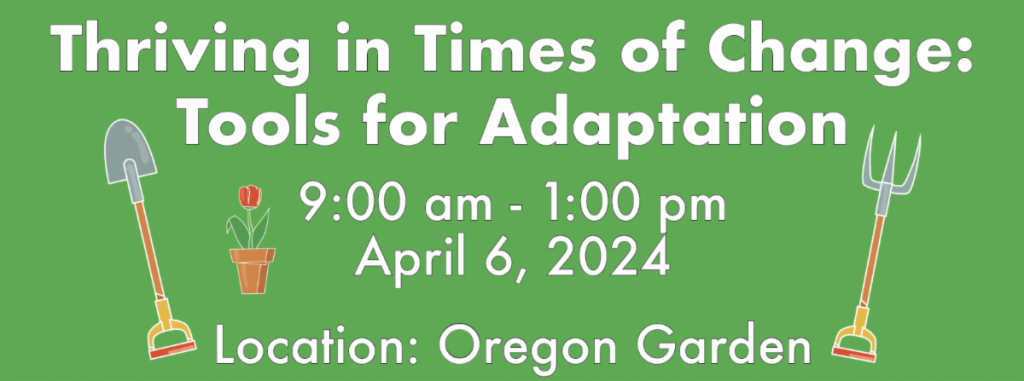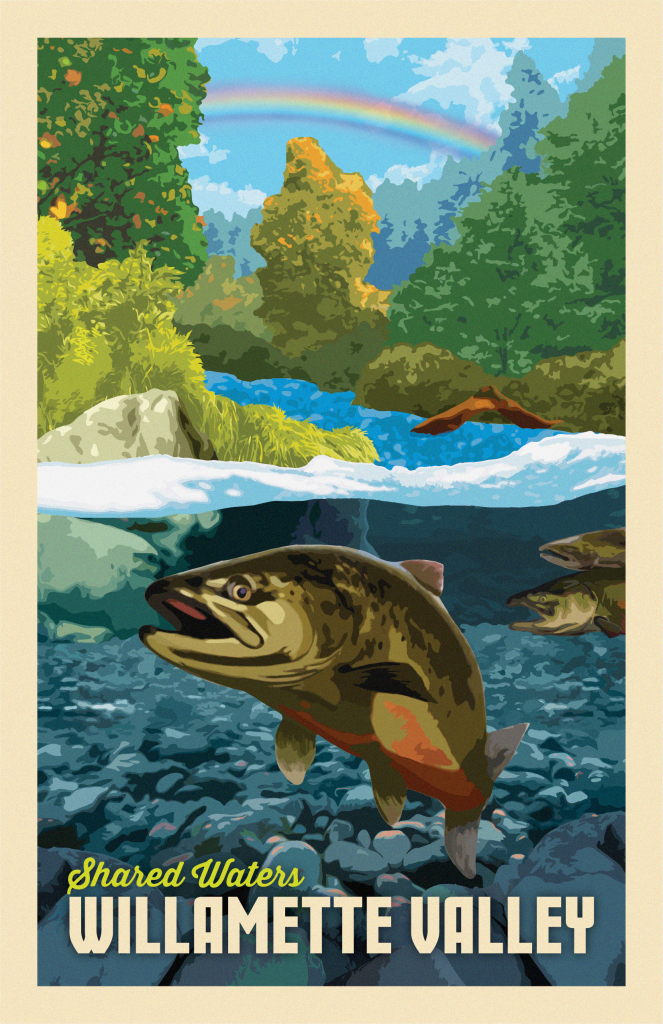Event Calendar

- This event has passed.
Thriving in Times of Change: Tools for Adaptation
April 6, 2024 @ 9:00 am - 1:00 pm

Join Marion SWCD at this event hosted by Sustainable Silverton.
This indoor and outdoor educational event is the second in Sustainable Silverton’s Thriving in Times of Change conference series. It will feature four topic areas that move through Silverton’s climate, water supply, fire and smoke threats and impacts, and plants in our urban forests and gardens. Using the traditional elements – air, water, fire, and earth – as a framework, each topic expands on and explores past and future actions to create empowerment. Overall, the day is a progression through what is or has been, what the future might be, and available steps which build personal and community resiliency.
General Admission: $12
Member Admission: Free
Click here to purchase tickets.
Your ticket to this event includes admission to The Oregon Garden. We encourage you to enjoy our grounds after the event!
Indoor Sessions
Air
The day starts with introductions and seminar overviews. Marion Soil and Water Conservation District will share information with guests about Silverton’s climate – our historical climate and what future climate changes mean for our part of Oregon. This topic will cover temperature throughout the year, precipitation, snowpack and drought patterns.
Water
The second session is about Silverton’s water resource. Silverton City Manager, Cory Misley, will present on Silverton’s water supply which supports our lives here, our gardens, and safety. This topic will discuss water resources – Abiqua and Silver creek watershed area and elevations, water sources, service details and current drought limitation policy. Over the course of the day, attendees will be supplied with knowledge to interpret this data and adjust their own actions towards building resiliency.
Earth
With the third seminar set we get our roots into the earth. Urban Forester Eric Hammond will share about Silverton’s urban forest – all the plants and trees that keep us green and shaded in the summer. During the second half of this session, Alyson Budde will expand on practical implementation when she presents information on soil and the ground that our plants, the urban forest, grows from. Marion Soil and Water Conservation District will also discuss growing your own urban oasis. Taken together, this topic will cover historical gardening practices and alterations to those habits – lawns, irrigation, mulch, high-impact inputs – and plant selection to keep attractive and functional gardens that are less environmentally impactful.
Fire
The fourth seminar is presented in cooperation with OSU’s Extension Fire Program. During this session, Kayla Bordelon will talk about fire and smoke in the Willamette Valley. She will talk about increasing fire risk and will provide guests with facts about the impact caused by fire, smoke, how to fire-harden our landscapes and homes and the real and significant impact these actions can have.
Outdoor Sessions
Fire
Kayla Bordelon will continue her presentation with outdoor assessment and practical fire-hardening steps guests can take at home.
Earth
Alyson Budde will follow with a practical demonstration about how to evaluate soil and the steps to take to regenerate the biome.
Earth & Water
We continue talking about earth and water with the practical sessions by Marion Soil and Water Conservation District. There are two brief interrelated sessions covering adapting your garden and de-stressing water in your garden. These will cover design considerations and actions that create greater drought resilience, such as irrigation zones, use of mulch, selection of Western natives and other deep drought resilient plants. Time will be spent on discussion of irrigation, style, timing, duration, how to get the most out of it, and doing it on a budget.
Earth
The final two sessions are meant to be specific and practical for Silverton’s ecosystem. Ron Garst will lead a conversation about habitat gardening techniques and practices. He will provide guests with steps they can take in our own yards to increase the usable wildlife habitat and about the specific animals we have in Silverton that will benefit from these changes.
Concluding, Eric Hammond and Kurt Berning, Pudding River Watershed Council, will lead a discussion about how to be an OAKeeper at home and in the community. We will look at Oregon white oaks and how to treat them as an affirmation of a resilient future.

